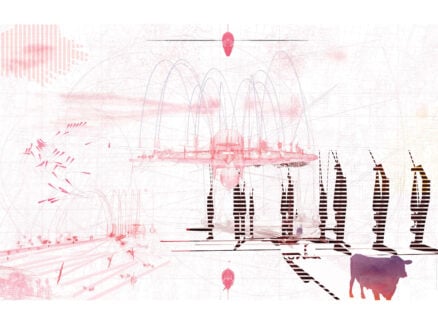
March 26, 2021
Paul Cocksedge Explores the Performative Side of Craft
On view at New York’s Friedman Benda, two new sculptural collections embody the theatricality of making.

British designer Paul Cocksedge is known for developing sculptural furnishings and large-scale public interventions that communicate complex concepts through clear, simplified forms. Each endeavor stems from a deep, undeterred inquiry into why things are the way they are. Whether developing a vessel-shaped lamp for Italian brand FLOS—that metaphorically grapples with the transience of life—or an outdoor installation for the London Design Festival—that combines benches and arches in seamless swathes of bentwood—Cocksedge is unafraid to challenge common perception.
The designer’s 2017 project, EXCAVATION: Evicted, was instigated after finding out that his Hackney, London studio was slated for demolition. Hoping to hold on to some memory of the place, he began drilling into the floor and extracting hundreds of extrusions. What he uncovered were layers of different composite and stone-based material, and in turn, the site’s convoluted history. Cocksedge was able to go so far as to uncover bricks for a Victorian stable that once stood on the site. These cores were then sanded and refined to become table bases, a collection that garnered acclaim at that year’s Salone del Mobile.

The designer recently reprised this resourceful process as a way of dealing with the COVID-19 pandemic. During multiple lockdowns in the UK, he worked closely with a group of essential construction workers to collect similar extractions from around the country. Sourced from a slew of hospital construction sites, these components stand as records of time. Taking this exploration a step further, Cocksedge implemented these excavated cylinders as molds to form glass-blown luminaires. “I wanted to combine the rawness of the stone material with the delicate and transparent qualities of glass,” he explains. “The translucent forms reflect the grain of the extracted pieces and the two contrasting components fit together like puzzle pieces.” He also iterated on this approach using CNC-milled cherry wood, a material traditionally used in the ancient craft of glassblowing.
For his latest solo exhibition Performance, on view at New York’s Friedman Benda gallery, Cocksedge chose to present both elements. By placing the molds directly below the finished product, he’s able to illustrate the bespoke process involved in its making. The demonstrative installation alludes to the physical and almost theatrical nature of glassblowing.

“As a designer, I make things in my studio but mostly rely on expert fabricators to realize various aspects of my work,” he explains. “I act as an observer, which gives me the critical distance to think about things that I might not if I were 100 percent involved in making or perfecting a skill. Seeing all the materials that go into the performance of glassblowing—sand, wood, air, water—you begin to wonder if these elements could be used to make something completely different like furniture.”
Cocksedge was also able to elucidate this self-reflection and perspective in his Push series, also present in the exhibition. The mammoth works derive from experiments the designer conducted placing rolled-up paper in constrained blocks to see how they would unfurl and lock into place. He worked with a London-based construction specialist to translate these structural investigations into large sculptures consisting of 20-millimeter-thick cantilevered steel sheets inserted into concrete blocks. The results form human-scale cocoons that one can sit in.
Both evocative collections honor the true nature of the materials and craftspeople involved but also demonstrate what can happen when there’s a willingness to break the mold by mixing-and-matching different techniques to achieve something entirely new. On view through April 17th, Performance occupies Friedman Benda’s bare space with almost no additional didactic information. The work speaks for itself and allows visitors to become observers as well, gaining a better understanding of the makers’ processes that are often taken for granted.
You may also enjoy “An Immersive Installation Brings the Goodnight Moon Room to Manhattan”
Would you like to comment on this article? Send your thoughts to: [email protected]
Register here for Metropolis’s Think Tank Thursdays and hear what leading firms across North America are thinking and working on today.




















